National Assembly (South Korea)
The National Assembly of the Republic of Korea, often shortened to the National Assembly in domestic English-language media, is the 300-member[2] unicameral national legislature of South Korea. Elections to the National Assembly are held every four years. The latest legislative elections were held on 15 April 2020. Single-member constituencies comprise 253 of the assembly's seats, while the remaining 47 are allocated by proportional representation, 30 of which are used to compensate for the Single-member constituencies. Members serve four-year terms.
National Assembly of the Republic of Korea 대한민국 국회 大韓民國國會 Daehanminguk Gukhoe | |
|---|---|
| 21st National Assembly | |
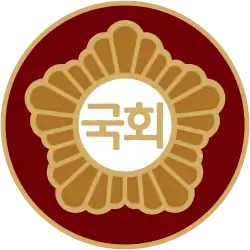 | |
 | |
| Type | |
| Type | |
| Leadership | |
Deputy Speaker | |
| Structure | |
| Seats | 300 |
 | |
Political groups |
|
Length of term | 4 years |
| Salary | $115,000 |
| Elections | |
| |
Last election | 15 April 2020 |
Next election | 17 April 2024 |
| Meeting place | |
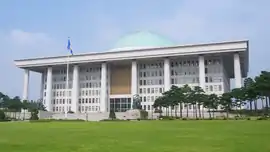 | |
| National Assembly Building Seoul, South Korea 37°31′55.21″N 126°54′50.66″E | |
| Website | |
| korea.assembly.go.kr | |
| Footnotes | |
| National Assembly | |
| Hangul | |
|---|---|
| Hanja | |
| Revised Romanization | Daehanminguk gukhoe |
| McCune–Reischauer | Taehanmin'guk kukhoe |
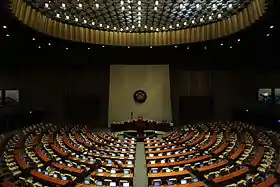
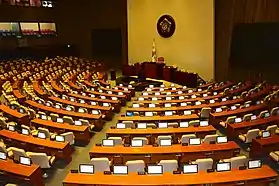
The unicameral assembly consists of at least 200 members according to the South Korean constitution. In 1990 the assembly had 299 seats, 224 of which were directly elected from single-member districts in the general elections of April 1988. Under applicable laws, the remaining seventy-five representatives were elected from party lists. By law, candidates for election to the assembly must be at least thirty years of age. As part of a political compromise in 1987, an earlier requirement that candidates have at least five years' continuous residency in the country was dropped to allow Kim Dae-Jung, who had spent several years in exile in Japan and the United States during the 1980s, to return to political life. The National Assembly's term is four years. In a change from the more authoritarian Fourth Republic and Fifth Republic (1972–80 and 1980–87, respectively), under the Sixth Republic, the assembly cannot be dissolved by the president.
Current composition
.png.webp)
| Group | Floor leader | Seats | % of seats | |
|---|---|---|---|---|
| Democratic | Kim Tae-nyeon | 174 | 58.0% | |
| People Power | Joo Ho-young | 102 | 34.0% | |
| Justice | Kang Eun-mi | 6 | 2.0% | |
| People | Kwon Eun-hee | 3 | 1.0% | |
| Open Democratic | Kim Jinai | 3 | 1.0% | |
| Basic Income | Yong Hye-in | 1 | 0.3% | |
| Period Transition | Cho Jung-hoon | 1 | 0.3% | |
| Independents | 10 | 3.3% | ||
| Total | 300 | 100.0% | ||
|
Notes:
| ||||
Structure and appointment
Speaker
The constitution stipulates that the assembly is presided over by a Speaker and two Deputy Speakers,[3] who are responsible for expediting the legislative process. The Speaker and Deputy Speakers are elected in a secret ballot by the members of the Assembly, and their term in office is restricted to two years.[4] The Speaker is independent of party affiliation, and the Speaker and Deputy Speakers may not simultaneously be government ministers.[4]
Negotiation groups
Parties that hold at least 20 seats in the assembly form floor negotiation groups (Korean: 교섭단체, Hanja: 交涉團體, RR: gyoseop danche), which are entitled to a variety of rights that are denied to smaller parties. These include a greater amount of state funding and participation in the leaders' summits that determine the assembly's legislative agenda.[5]
In order to meet the quorum, the United Liberal Democrats, who then held 17 seats, arranged to "rent" three legislators from the Millennium Democratic Party. The legislators returned to the MDP after the collapse of the ULD–MDP coalition in September 2001.[6]
Legislative process
To introduce a bill, a legislator must present the initiative to the Speaker with the signatures of at least ten other members of the assembly. The bill must then be edited by a committee to ensure that the bill contains correct and systematic language. It can then be approved or rejected by the Assembly.[7]
Committees
There are 17 standing committees which examine bills and petitions falling under their respective jurisdictions, and perform other duties as prescribed by relevant laws.
- House Steering Committee
- Legislation and Judiciary Committee
- National Policy Committee
- Strategy and Finance Committee
- Science, ICT, Future Planning, Broadcasting and Communications Committee
- Education Committee
- Culture, Sports and Tourism Committee
- Foreign Affairs and Unification Committee
- National Defense Committee
- Security and Public Administration Committee
- Agriculture, Food, Rural Affairs, Oceans and Fisheries Committee
- Trade, Industry and Energy Committee
- Health and Welfare Committee
- Environment and Labor Committee
- Land, Infrastructure and Transport Committee
- Intelligence Committee
- Gender Equality and Family Committee
Election
Since the promulgation of the March 1988 electoral law, the assembly has been elected every four years through a Supplementary Member system, meaning that some of the members are elected from constituencies according to the system of first past the post, while others are elected at a national level through proportional representation.[8] As of 2016, 253 members represent constituencies, while 47 were elected from PR lists. In contrast to elections to the Assembly, presidential elections occur once every five years, and this has led to frequent situations of minority government and legislative deadlock.[9]
Legislative violence
From 2004 to 2009, the assembly gained notoriety as a frequent site for legislative violence.[10] The Assembly first came to the world's attention during a violent dispute on impeachment proceedings for then President Roh Moo-hyun,[11][12] when open physical combat took place in the assembly. Since then, it has been interrupted by periodic conflagrations, piquing the world's curiosity once again in 2009 when members battled each other with sledgehammers and fire extinguishers.[13][14][15] Images of the melee were broadcast around the world.
History

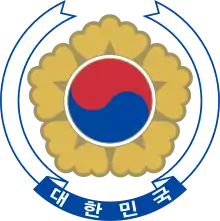 |
|---|
| This article is part of a series on the politics and government of the Republic of Korea |
|
|
First Republic
Elections for the assembly were held under UN supervision[16] on 10 May 1948. The First Republic of South Korea was established on 17 July 1948[17] when the constitution of the First Republic was established by the Assembly. The Assembly also had the job of electing the President, and elected anti-communist Syngman Rhee as president on 10 May 1948.
Under the first constitution, the National Assembly was unicameral. Under the second and third constitutions, the National Assembly became bicameral and consisted of the House of Commons and the Senate, but actually unicameral with the House of Commons because the House of Commons could not pass a bill to establish the Senate.
Conservative Liberal Progressive
majority plurality only largest minority
| National Assembly |
Majority Party |
Majority Leader |
Seats | Speaker | Seats | Minority Leaders |
Minority Parties | ||
|---|---|---|---|---|---|---|---|---|---|
| 1st (1948) |
NARRKI→NA | 55 | 1948 Rhee Syng-man (supported by NARRKI) 1948–1950 Shin Ik-hee (supported by NARRKI until 1949) |
29 | KDP→DNP | ||||
| 116 | others | ||||||||
| 2nd (1950) |
DNP | 24 | Shin Ik-hee (supported by DNP) | 24 | KNP | ||||
| 14 | NA | ||||||||
| 148 | others | ||||||||
| 3rd (1954) |
LP | 114 | Yi Ki-bung (supported by LP) | 15 | DNP→DP (55) | ||||
| 3 | NA | ||||||||
| 3 | KNP | ||||||||
| 68 | others | ||||||||
| 4th (1958) |
LP | 126 | Yi Ki-bung (supported by LP) | 79 | DP (55) | ||||
| 28 | others | ||||||||
Second Republic
| House of Commons |
Majority Party |
Majority Leader |
Seats | Speaker | Seats | Minority Leaders |
Minority Parties | ||
|---|---|---|---|---|---|---|---|---|---|
| 5th (1960) |
DP (55) | 175 | Kwak Sang-hoon (supported by DP (55)) | 58 | Others | ||||
| Senate | Majority Party |
Majority Leader |
Seats | Speaker | Seats | Minority Leaders |
Minority Parties | ||
|---|---|---|---|---|---|---|---|---|---|
| 5th (1960) |
DP (55) | 31 | Baek Nak-jun (supported by DP (55)) | 27 | Others | ||||
Third Republic
Since the reopening of the National Assembly in 1963 until today, it has been unicameral.
| National Assembly |
Majority Party |
Majority Leader |
Seats | Speaker | Seats | Minority Leaders |
Minority Parties | ||
|---|---|---|---|---|---|---|---|---|---|
| 6th (1963) |
DRP | 110 | Lee Hyu-sang (supported by DRP) | 41 | CRP→PP→NDP | ||||
| 13 | DP (55)→PP→NDP | ||||||||
| 7th (1967) |
DRP | 129 | Lee Hyu-sang (supported by DRP) | 45 | NDP | ||||
| 8th (1971) |
DRP | 113 | Baek Du-jin (supported by DRP) | 89 | NDP | ||||
Fourth Republic
| National Assembly |
Majority Party |
Majority Leader |
Seats | Speaker | Seats | Minority Leaders |
Minority Parties | ||
|---|---|---|---|---|---|---|---|---|---|
| 9th (1973) |
DRP+Presidential appointees | 146 | Chung Il-kwon (supported by DRP) | 52 | NDP | ||||
| 10th (1978) |
DRP+Presidential appointees ↓ KNP |
145 | 1978–1879 Chung Il-kwon (supported by DRP) 1979 Baek Du-jin (supported by DRP) |
61 | NDP | ||||
Fifth Republic
| National Assembly |
Majority Party |
Majority Leader |
Seats | Speaker | Seats | Minority Leaders |
Minority Parties | ||
|---|---|---|---|---|---|---|---|---|---|
| 11th (1981) |
DJP | 151 | 1981–1983 Chung Rae-hyung (supported by DJP) 1983–1985 Chae Mun-shik (supported by DJP) |
81 | DKP | ||||
| 25 | KNP | ||||||||
| 12th (1985) |
DJP | 148 | Lee Jae-hyung (supported by DJP) | 67 | NKDP | ||||
| 35 | DKP | ||||||||
| 20 | KNP | ||||||||
Sixth Republic
majority plurality largest minority
| Term (Election) | Composition (at commencement) |
Speaker | Majority floor leader | Minority floor leader (largest parliamentary group) |
Conservative current: PPP |
Liberal current: DP |
Progressive current: JP |
Miscellaneous right |
Miscellaneous left |
Independent |
|---|---|---|---|---|---|---|---|---|---|---|
| 13th (1988) | 70:104:125
|
Kim Jae-sun (1988–90) Park Jyun-kyu (1990-92) |
Yoon Gil-joong (1988) Park Jyun-kyu (1988–90) Park Tae-joon (1990) Kim Young-sam (1990-92) (DJP→DLP) |
Kim Dae-jung (PDP→DP91) |
125 | 70 | - | 59 | 36 | 9 |
| 14th (1992) | 97:52:149
|
Park Jyun-kyu (1992–93) Hwang Nak-joo (1993) Lee Man-sup (1993–94) Park Jyun-kyu (1994–96) |
Kim Young-sam (1992) Kim Jong-pil (1992-95) Lee Chun-gu (1995) Kim Yoon-hwan (1995-96) (DLP→NKP) |
Kim Dae-jung (1992–93) Lee Ki-taek (1993–95) Kim Dae-jung (1995–96) (DP91→NCNP) |
149 | 97 | - | - | 31 | 21 |
| 15th (1996) | 79:81:139
|
Kim Soo-han (1996–98) Park Jyun-kyu (1998–00) |
Lee Hong-koo (1996–97) Lee Hoi-chang (1997) Lee Man-sup (1997) Lee Hoi-chang (1997) Lee Han-dong (1997) Mok Yo-sang (1997) Lee Sang-deuk (1997-98) Ha Sun-bong (1998) Park Hee-tae (1998-99) Lee Bu-young (1999-00) (NKP→GNP) |
Cho Se-hyeong (1996-99) Kim Young-bae (1999) Lee Man-sup (1999-00) Seo Young-hoon (2000) (NCNP→MDP) |
139 | 79 | - | 65 | - | 16 |
| 16th (2000) | 115:25:133
|
Lee Man-sup (2000–02) Park Kwan-yong (2002–04) |
Jeon Chang-hwa (2000–01) Lee Jae-oh (2001–02) Lee Kyu-taek (2002–03) Hong Sa-duk (2003–04) (GNP) |
Seo Young-hoon (2000) Kim Jung-kwon (2000-01) Han Kwang-ok (2001-02) Han Hwa-gap (2002-03) Chyung Dai-chul (2003) Park Sang-cheon (2003) Cho Soon-hyung (2003-04) (MDP) |
133 | 115 | - | 20 | - | 5 |
| 17th (2004) | 10:152:16:121
|
Kim Won-ki (2004–06) Lim Chae-jung (2006–08) |
Chun Jung-bae (2004–05) Chung Sye-kyun (2005–06) Kim Han-gil (2006–07) Chang Young-dal (2007–08) Kim Hyo-seuk (2008) (UP→UDP) |
Kim Deog-ryong (2004–05) Kang Jae-sup (2005–06) Lee Jae-oh (2006) Kim Hyong-o (2006–07) Ahn Sang-soo (2007–08) (GNP) |
121 | 152 | 10 | 4 | 9 | 3 |
| 18th (2008) | 5:81:60:153
|
Kim Hyong-o (2008–10) Park Hee-tae (2010–12) Chung Eui-hwa (2012) |
Hong Jun-pyo (2008–09) Ahn Sang-soo (2009–10) Kim Moo-sung (2010–11) Hwang Woo-yea (2011-12) (GNP→SP/NFP) |
Won Hye-young (2008–09) Lee Kang-lae (2009-10) Park Jie-won (2010–11) Kim Jin-pyo (2011–12) (UDP→DP08→DUP) |
153 | 81 | 5 | 32 | 3 | 25 |
| 19th (2012) | 13:127:8:152
|
Kang Chang-hee (2012–14) Chung Ui-hwa (2014–16) Chung Eui-hwa (2012) |
Lee Hahn-koo (2012–13) Choi Kyoung-hwan (2013–14) Lee Wan-koo (2014–15) Yoo Seung-min (2015) Won Yoo-chul (2015-16) (SP/NFP) |
Park Jie-won (2012) Park Ki-choon (2012-13) Jun Byung-hun (2013–14) Park Young-sun (2014) Kim Yung-rok (2014) Woo Yoon-keun (2014–15) Lee Jong-kul (2015–16) (DUP→DP11→NPAD→DP14) |
152 | 127 | 13 | 5 | - | 3 |
| 20th (2016) | 6:123:49:122
|
Chung Sye-kyun (2016–18) Moon Hee-sang (2018–20) Chung Eui-hwa (2012) |
Woo Sang-ho (2016-17) Woo Won-shik (2017-18) Hong Young-pyo (2018–19) Lee In-young (2019–20) (DP14) |
Chung Jin-suk (2016) Chung Woo-taek (2016–17) Kim Sung-tae (2017–18) Na Kyung-won (2018–19) Shim Jae-chul (2019-20) (SP/NFP→LKP→UFP) |
122 | 123 | 6 | - | 38 | 11 |
| 21st (2020) | 6:180:11:103
|
Park Byeong-seug (2020–present) | Kim Tae-nyeon (2020–present) (DP14) |
Joo Ho-young (2019-present) (UFP→PPP) |
103 | 180 | 6 | 3 | 3 | 5 |
Members
- List of members of the South Korean Constituent Assembly
- List of members of the National Assembly (South Korea), 1950–1954
- List of members of the National Assembly (South Korea), 1954–1958
- List of members of the National Assembly (South Korea), 1981–1985
- List of members of the National Assembly (South Korea), 1985–1988
- List of members of the National Assembly (South Korea), 1988–1992
- List of members of the National Assembly (South Korea), 1992–1996
- List of members of the National Assembly (South Korea), 1996–2000
- List of members of the National Assembly (South Korea), 2000–2004
- List of members of the National Assembly (South Korea), 2004–2008
- List of members of the National Assembly (South Korea), 2008–2012
- List of members of the National Assembly (South Korea), 2012–2016
- List of members of the National Assembly (South Korea), 2016–2020
- List of members of the National Assembly (South Korea), 2020–2024
See also
References
- The Speaker is required to not have membership of any political party during his or her tenure as Speaker, by law. Formerly a member of the Democratic
- Article 21, Clause 1 of the Election Law
- Article 48 of the Constitution of the Republic of Korea.
- Park, Young-Do (2010). "Kapitel 2: Verfassungsrecht". Einführung in das koreanische Recht [Introduction to Korean Law] (in German). Springer. p. 25. ISBN 9783642116032.
- Youngmi Kim (2011). The Politics of Coalition in South Korea. Taylor & Francis, p. 65.
- Y. Kim, pp. 68–9.
- Park 2010, p. 27.
- Aurel S. Croissant, "Electoral Politics of South Korea", in Croissant et al. (2002) Electoral Politics in Southeast and East Asia. Friedrich Ebert Foundation, p. 257.
- Croissant, p. 257.
- "The World's Most Unruly Parliaments".
- "South Korean president impeached". 12 March 2004 – via news.bbc.co.uk.
- "In pictures: Impeachment battle". 12 March 2004 – via news.bbc.co.uk.
- Glionna, By John M. "South Korea lawmakers: Reaching across the aisle with a sledgehammer". Los Angeles Times.
- "South Korean politicians use fire extinguishers against opposition". 18 December 2008 – via www.telegraph.co.uk.
- "Hall of Violence". 2 March 2009.
- Setting the Stage Archived 16 July 2007 at the Wayback Machine
- ICL – South Korea Index Archived 13 December 2006 at the Wayback Machine